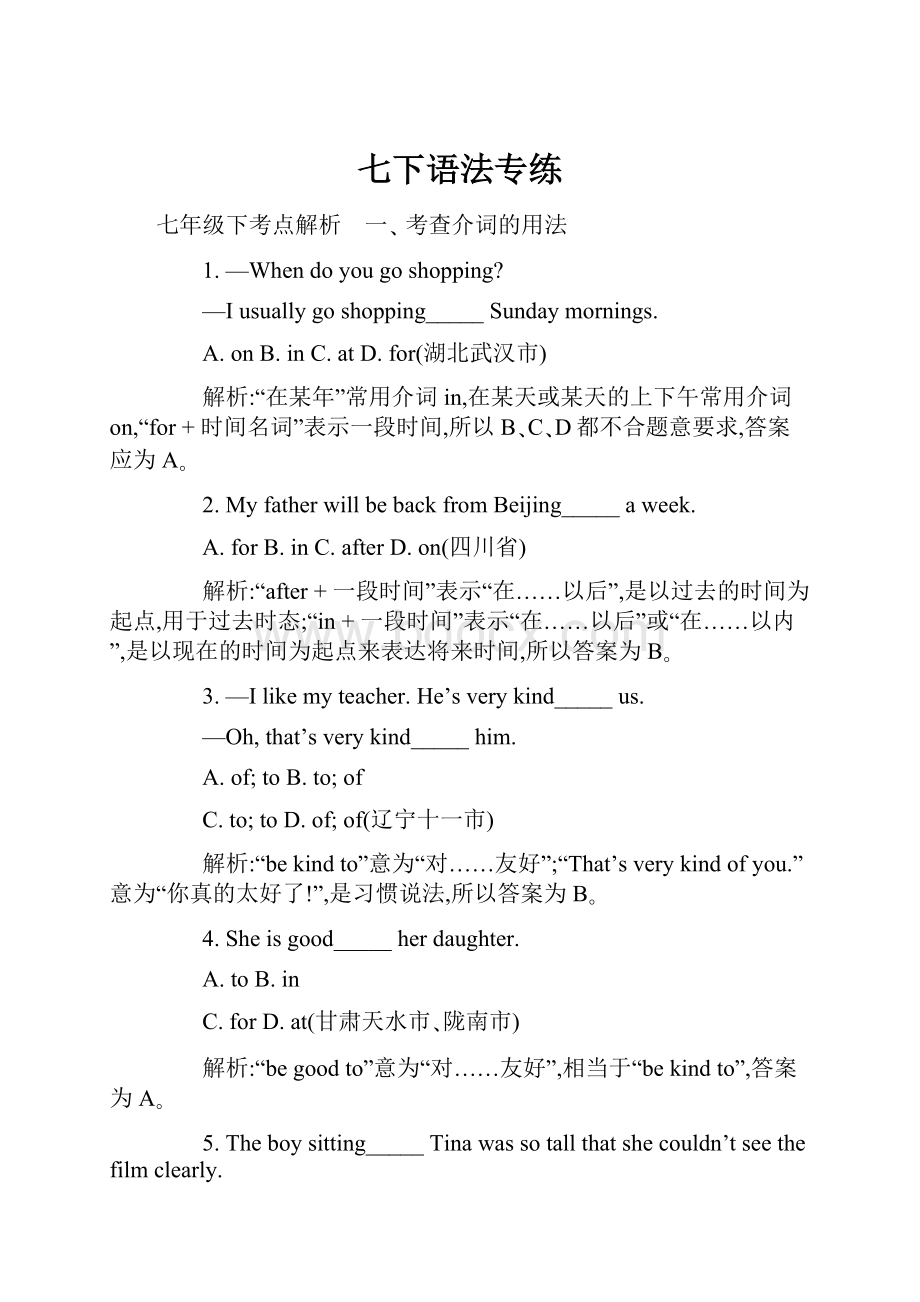七下语法专练.docx
《七下语法专练.docx》由会员分享,可在线阅读,更多相关《七下语法专练.docx(53页珍藏版)》请在冰豆网上搜索。

七下语法专练
七年级下考点解析 一、考查介词的用法
1.—Whendoyougoshopping?
—Iusuallygoshopping_____Sundaymornings.
A.onB.inC.atD.for(湖北武汉市)
解析:
“在某年”常用介词in,在某天或某天的上下午常用介词on,“for+时间名词”表示一段时间,所以B、C、D都不合题意要求,答案应为A。
2.MyfatherwillbebackfromBeijing_____aweek.
A.forB.inC.afterD.on(四川省)
解析:
“after+一段时间”表示“在……以后”,是以过去的时间为起点,用于过去时态;“in+一段时间”表示“在……以后”或“在……以内”,是以现在的时间为起点来表达将来时间,所以答案为B。
3.—Ilikemyteacher.He’sverykind_____us.
—Oh,that’sverykind_____him.
A.of;toB.to;of
C.to;toD.of;of(辽宁十一市)
解析:
“bekindto”意为“对……友好”;“That’sverykindofyou.”意为“你真的太好了!
”,是习惯说法,所以答案为B。
4.Sheisgood_____herdaughter.
A.toB.in
C.forD.at(甘肃天水市、陇南市)
解析:
“begoodto”意为“对……友好”,相当于“bekindto”,答案为A。
5.Theboysitting_____Tinawassotallthatshecouldn’tseethefilmclearly.
A.behindB.infrontofC.besideD.nextto(安徽省)
解析:
“Tina看不清电影”是因为“坐在她前面的男孩个子太高”,infrontof意为“在……前面“,符合题意,所以答案为B。
6.“Ladiesfirst”means“Ladies_____gentlemen”.
A.afterB.nearC.besideD.before(山东省)
解析:
“Ladiesfirst”意为“女士优先”,before意为“在……前面”,符合题意,所以答案为D。
7.—What’sthematter_____MrLiu?
Heiswetthrough.
—Hiscarrun_____theriver.
A.with;intoB.from;in
C.with;toD.to;at(湖北黄冈市)
解析:
“What’sthematterwith...?
”意为“……怎么了?
”,“runinto...”意为“开到……里”,所以答案为A。
8.Don’tlisten_____music_____thehallways.
A.to;onB.for;at
C.to;inD.in;thanks(山东潍坊市)
解析:
listento意为“听”,是固定搭配。inthehallways意为“在走廊上”,所以答案为C。
9.Doyouknowthestudent_____DavidandJeff?
A.amongB.inC.betweenD.around(湖南湘潭市)
解析:
“between...and...”意为“在……(两者)之间”;among表示“在三者或三者以上之间”,故答案为C。
10._____yourhelp,Ican’tgettheinformationaboutHawaiieasily.
A.WithB.WithoutC.UnderD.Below(吉林省)
解析:
withyourhelp意为“在你的帮助下”,withoutyourhelp意为“没有你的帮助”。根据题意,答案应为B。
11.Theboy_____awhitejacketiswaitingatthebusstop.
A.onB.inC.ofD.on(江苏南通市)
解析:
inawhitejacket是介词短语作后置定语。in后面接表示衣着的名词或表示颜色的词时,意为“穿着、戴着”,所以答案为B。
12._____8∶00ofAugust8,2008,Beijingwillholdthe29thOlympicGames.
A.AtB.InC.OnD.By(甘肃省)
解析:
在钟点前应用介词at,所以答案为A。
13.Weshouldreturnthebookstothelibrary_____time.
A.aboutB.onC.byD.for(辽宁大连市)
解析:
ontime意为“准时、按时”,符合题意,所以答案为B。
14.Herearesomeflowers_____you______ourbestwishes.
A.to;forB.for;with
C.of;toD.at;with(江苏盐城市)
解析:
for表示所给的对象,withourbestwishes意为“致以我们最美好的祝愿”,所以答案为B。
15.Everyweek,wehaveclasses_____MondaytoFriday.
A.onB.toC.withD.from(广西南宁市)
解析:
选项中只有from能和to搭配,“from...to...”意为“从……到……”,故答案为D。
16.Lindaoftenhelpshermother_____thehouseworkonweekends.
A.withB.toC.ofD.for(北京市)
解析:
helpsbwithsth意为“帮助某人干某事”,故答案为A。
17.Theyarrived_____thestationlatelastnight.
A.atB.inC.onD.to(江苏南京市)
解析:
arrive意为“到达”,是不及物动词,到小地方,后跟at,到大地方,后跟in,station为小地方,所以答案为A。
二、考查动词的用法
1.Ithinkheisright.(改为否定句)
I_____thinkhe_____right.(山东临沂市)
解析:
主句为Ithink,后接宾语从句构成的主从复合句在变为否定句时,常否定主句的谓语动词。因此,空白处应填don’t和is。
2.—Ithasn’trainedforquitesometime.
—I_____itwillraintomorrow.
A.needB.wantC.hopeD.like(湖北武汉市)
解析:
hope意为“希望”,Ihope后接从句,表示希望的内容。其它几个动词后面不能接从句,故答案为C。
3.There_____someoldpeopletakingawalkinthepark.
A.isB.areC.hasD.have(重庆市)
4.There_____manynewwordsinLessonOne.Itisveryeasy.
A.isB.aren’tC.isn’tD.are(江苏南通市)
5._____apenandtwobooksonthedesk.
A.ThereareB.ThereisC.HaveD.Has(贵州毕节市)
6.There_____adeskandsomechairsintheroom.
A.amB.isC.areD.be(江苏南京市)
解析:
Thereare后接名词的复数形式;Thereis后接名词的单数形式。Therebe后接多个并列成分时,be的形式通常与和它最靠近的名词的数保持一致。没有Therehave/has这样的搭配。所以上面四道题的答案分别为:
3.B4.B5.B6.B
7.—Dowehavetowearsneakersforthegymclass?
—Yes,_____.
A.wedoB.wehave
C.wehavetoD.wemust(山东青岛市)
解析:
本题主要考查含有haveto的一般疑问句的肯定答语形式。疑问句以助动词Do开头,haveto中的have应视为实义动词,答语中的动词仍用do,故答案应为A。
8.Ienjoy_____themusic.
A.listeningtoB.listening
C.listentoD.tolistento(北京市)
解析:
enjoy后应接动词的?
鄄ing形式,listento为固定搭配,故答案为A。
9.—_____IborrowyourMP3?
—Sure.Hereyouare.
A.MayB.ShouldC.MustD.Would(北京市)
解析:
英语中表示请求时可用“Could/MayI...?
”,四个选项中只有May符合题意,故答案为A。
10.Don’tplaycomputergamesagain.You_____studyhard.
A.canB.may
C.mustD.needn’t(贵州毕节市)
解析:
前一句为否定祈使句,空白处应填must,意为“必须”,语气肯定,故答案为C。
11.You_____worryabouthim.Hewillgetwellsoon.
A.needn’tB.can’t
C.mustn’tD.maynot(江苏南通市)
解析:
needn’t,意为“不必”,mustn’t意为“一定不要;不允许”。根据后一句的意思,答案应为A。
12.—Jim,canyouhelpmetowashthedishes?
—Sorry,Dad,I_____totheshop.
A.goB.wentC.amgoingD.havebeen(江西省)
解析:
本题考查“动词的进行时态表示将要做或准备做某事”的用法,所以答案应为C。
三、考查不定代词的用法
1.—Wouldyoulikeabagofrice?
—Yes.Ihave_____riceathome.
A.someB.littleC.alittleD.afew(四川省)
2.Ican’tbuythedressbecauseIhavejust_____money.
A.littleB.alittle
C.fewD.afew(江苏南通市)
3.Wouldyoupleasebuysomesaltforme,Tony?
Thereis_____left.
A.littleB.alittle
C.fewD.afew(武汉市教改区)
解析:
few与afew均修饰可数名词的复数形式,little与alittle修饰不可数名词,few与little表示否定意义,afew与alittle表示肯定意义,justalittle意为“只有一点儿”。以上三道题的答案分别为:
1.B,2.B,3.A
4.Beckhasbought_____newcomputeryesterday.Isit_____onherdesk?
A.an;theoneB.a;one
C.a;theoneD.the;acomputer(湖北孝感市)
解析:
本题主要考查替代词one的用法。one是泛指,可以用来指同类中的一个。和the连用时可以用来替代上文已提到的人或物。根据题意,答案应为C。
5.Whenwegottothecitycenter,_____shopswerestillopen.Butmostofthemwereclosed
A.theB.someC.manyD.×(江西省)
解析:
根据下文中“大部分商店关门了”可以推知,还有一些商店没有关门,所以答案应为B。
6._____ofuscanuseacomputer.
A.EveryoneB.EveryoneC.NobodyD.Everybody(江苏省)
解析:
everyone用来指人,不能与of短语连用;everyone既可指人,也可以指物,可以与of短语连用,所以答案为B。
7.Idon’tlikethisbike.Pleasegiveme_____one.
A.otherB.anotherC.theotherD.others(广东广州市)
解析:
表示“另外一个”时,theotherone是特指;anotherone是泛指,故答案为B。
四、其它考点
1.YoucanseethenoticeEVERYTHINGHALFPRICEina_____.
A.bankB.schoolC.theatreD.shop(湖北荆门市)
2.Therestaurantissopopularhere.Look,therearesomany_____here.
A.foodB.dish
C.peopleD.waiter(江苏徐州市)
解析:
这两题要考查学生通过语境理解和掌握词义及词形的情况,答案分别为D和C。
3.—Hi,Ann!
Thisismysister,Melissa.
—______
A.Howareyou?
B.Nicetomeetyou.
C.It’sverykindofyou.D.Howoldareyou?
(湖北十堰市)
解析:
“Nicetomeetyou.”是第一次见面时常用的问候语,故答案为B。
4.—Doyouwanttogo?
—______
A.Maybe.Whattimeisit?
B.Seeyoulater.
C.Don’tworry!
D.Itdoesn’tmatter.(浙江省)
解析:
四个选项中,只有A项符合语境,所以答案为A。
5.—Whataniceday!
Let’sgoforapicniconthebeachtogether.
—______.
A.GoodbyeB.Goodidea
C.GoodjobD.Goodday(浙江杭州市)
解析:
表示同意别人的建议时常用“Goodidea.”作答,故答案为B。
6.Kate,thereisapictureofapandaon_____.
A.the55pageB.page55C.page55th(湖北武汉市)
解析:
page55=the55thpage,意为“第55页”,故答案为B。
7.—Wouldyouliketoplaybasketballwithus?
—Yes,I’dloveto._____I’mafraidIhavenotime.
A.SoB.But
C.OrD.And(福建福州市中考课改卷)
解析:
and表示并列递进,so表示因果,but表示意义或语气转折,or表示选择或转折。根据题意及各个选项的意义,答案应为B。
8.Myclassmatesoftenhavelunchatschool.(对划线部分提问)
__________yourclassmatesoftenhavelunch?
(湖南湘潭市)
解析:
划线部分为表示地点的状语,对地点状语提问时用疑问副词where开头,所以空白处应分别填Where和do。
B.重点动词
(一)动词+doing
1.Likedoingeg:
IlikewatchingTV.
2.enjoydoingeg:
Peterenjoysreadingbooks.
3.findsbdoingstheg:
Youcanfindpeopleeatinghamburgers.
4.havefundoingstheg:
Wehavegreatfunplayinginthewater.
5.stopdoingeg:
Stoptalking,please.
6.Thanksfordoingeg:
Thanksforhelpingus.
7.Whatabout/Howaboutdoingeg:
Whataboutplayingsoccerball?
8.bebusydoingstheg:
Sheisbusydoingherhomework.
9.minddoingstheg:
Idon'tmindsmokingoutside
10.practicedoingstheg:
Heispracticingplayingtheguitar.
11.stopdoingstheg:
Sheneverstopstalking
(二)动词+do(原形)
1.Watchsbdostheg:
OldHenrywatchedhisdogplaywithacat.
2.helpsbdostheg:
Ihelpedhimfindhisfather.
3.makesbdostheg:
Hisstorymakesmefeelhappy.
4.let'sdostheg:
Let'sgototheschool.
(三)动词todo
1.tellsbtodostheg:
Hetoldmetocomebacksoon.
2.wanttodostheg:
IwanttovisitBeijing.
3.decidetodostheg:
Theydecidedtoplaytennislastweekend.
4.havetodostheg:
Wehavetodeanclassroomsafterschool.
5.writetosbeg:
Pleasewritetomesoon.
6.It'stimetodostheg:
It'stimetogohomenow.
7.stoptodostheg:
Shestopstotalk,Shedoherhomework.
8.liketodostheg:
Herbrotherlikestoswim.
9.wouldliketodostheg:
Iwouldliketoeatdinnerathome.
10.remembertodostheg:
Youremembertostudyforthelasttest.
(四)其他知识点
1.Some与any的区别:
Some一般情况下用于肯定句/any一般用于否定句/疑问句
当句中有情态动词can,could,will,would等时some可以用在否定句或疑问句中,表示语气委婉.
eg:
I'dlikesomedumplings./Doyouhaveanybrothers?
eg:
Wouldyoulikesomenoodles?
2.also,too也、太,与either的区别:
also用于句中,too用于句尾,either用于否定句中。
eg:
Heis__________ateacher→Heisateacher,__________.
eg:
Hedoesn'tliketigers,______.Idon'tmathbecauseit's______difficult.
3.With用法①与……在一起;②伴随、带着;③用;④agreewith搭配
①SheoftengoestoseeBeijingOperawithherfather.( )
②Wewritewithpens.( )
③Ourteachercameinwithasmile.( )
4.at,in,on在时间用法上的区别
①on表示时间时,一般用于某日、某天的上午、下午、晚上
onSaturday,onSundaymorning
②in用于表示一段时间或季节(月分、年)
inSeptember,inSummer,in2004
③at表示时刻或某一时间点atteno'clock,atnoon(在正午)
练习:
用on,inat填空或不填。
________themorning,________Mondayafternoon,________night
________6:
30,________winter,________March8th,________July
________Tuesday,________2005,_______